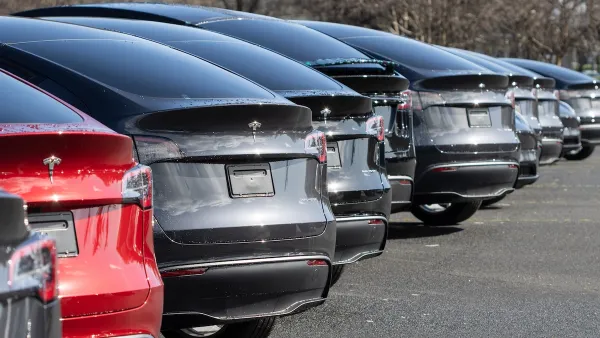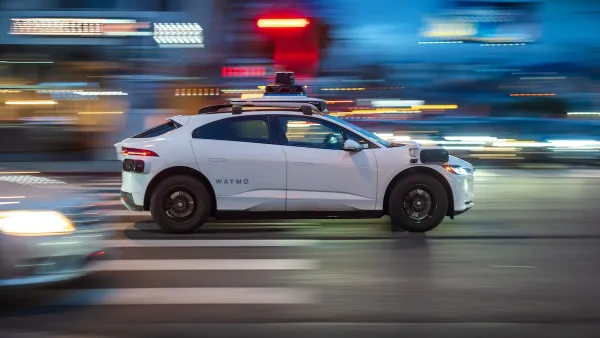In hyper-dense cities where incentives to reduce car use and eliminate parking are already high, mass adoption of AVs won’t significantly reduce parking demand.

Although supporters of autonomous vehicle technology tout the potential for AVs to revolutionize curb management and eliminate the need for parking lots and garages, a new study, somewhat ironically funded by AV operator Venmo, reveals that this will likely not be the case in cities with already limited parking. Kea Wilson describes the results in Streetsblog.
The study took a different approach than most theoretical models. “Rather than assuming that AVs would be a parking-reduction panacea, though, the researchers modeled a range of scenarios wherein the demand for car storage dropped by as little as 20 or as much as 80 percent — and asked tough questions about whether the specific parcels that drop in demand would free up would actually be redeveloped into an apartment building, based on existing market incentives, lot size, and other factors.” According to Nico Larco, director of the Urbanism Next Center at the University of Oregon, the study indicates that “parking is not what is limiting development” in already dense and pricy neighborhoods of San Francisco.
Larco points out that most of the need for parking in a city like San Francisco comes from outside the city itself: “it’s people coming from the periphery into the center who are the ones parking their cars. If you don’t have massive geographic penetration, the amount of reduction you’re going to see is going to be a lot smaller…and unless you can get your business model to work in the downtown core and in the suburbs, you’re not going to have that scale of deployment you need to put a real dent in parking.” The mass adoption of AVs could have a more significant impact on parking demand in expensive but car-oriented cities like Los Angeles.
Larco questions the value of pouring billions of dollars and resources into AVs in lieu of investing in less glamorous, tried-and-true transportation options: “Would a bike lane, or some other, more mundane mobility [improvement], maybe have made more sense?”
FULL STORY: The AV Revolution Probably Won’t Revolutionize Parking in Dense Cities

Maui's Vacation Rental Debate Turns Ugly
Verbal attacks, misinformation campaigns and fistfights plague a high-stakes debate to convert thousands of vacation rentals into long-term housing.

Planetizen Federal Action Tracker
A weekly monitor of how Trump’s orders and actions are impacting planners and planning in America.

San Francisco Suspends Traffic Calming Amidst Record Deaths
Citing “a challenging fiscal landscape,” the city will cease the program on the heels of 42 traffic deaths, including 24 pedestrians.

Adaptive Reuse Will Create Housing in a Suburban Texas Strip Mall
A developer is reimagining a strip mall property as a mixed-use complex with housing and retail.

Study: Anti-Homelessness Laws Don’t Work
Research shows that punitive measures that criminalized unhoused people don’t help reduce homelessness.

In U.S., Urban Gondolas Face Uphill Battle
Cities in Latin America and Europe have embraced aerial transitways — AKA gondolas — as sustainable, convenient urban transport, especially in tricky geographies. American cities have yet to catch up.
Urban Design for Planners 1: Software Tools
This six-course series explores essential urban design concepts using open source software and equips planners with the tools they need to participate fully in the urban design process.
Planning for Universal Design
Learn the tools for implementing Universal Design in planning regulations.
Heyer Gruel & Associates PA
JM Goldson LLC
Custer County Colorado
City of Camden Redevelopment Agency
City of Astoria
Transportation Research & Education Center (TREC) at Portland State University
Jefferson Parish Government
Camden Redevelopment Agency
City of Claremont





























